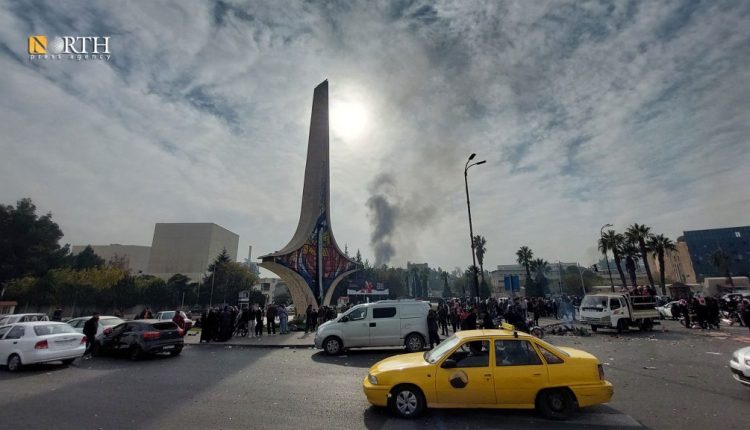
By Abdel Salam Khawja
QAMISHLI, Syria (North Press) – Syrian analysts agree on the necessity of a political settlement between the Transitional Government in Damascus and the Syrian Democratic Forces (SDF). However, they differ on the reasons why an agreement has not yet been reached.
A potential agreement—anticipated by a broad segment of Syrians—would significantly influence the “shaping of Syria’s future,” according to experts.
Anas Jouda, head of the National Construction Movement, argues that an agreement between the SDF and the Syrian Transitional Government is more than necessary. He emphasizes that such a deal “could serve as the primary political pillar for the transitional process, given the SDF and the Autonomous Administration’s social and economic presence and their governance model.”
On Monday, General Mazloum Abdi, the Commander of the SDF, congratulated Ahmed Al-Shara’ on assuming the presidency during the transitional phase in an exclusive interview with North Press. Abdi expressed his hope that Al-Shara’ would “successfully lead Syria through this critical period.”
The SDF commander also reaffirmed his forces’ support for “any efforts aimed at achieving stability and national unity.”
“National Frameworks”
In a voice message from Damascus to North Press, Jouda stated, “Of course, an agreement is challenging because it involves key issues such as the army, borders, national resources, as well as the fate of ISIS detainees and refugee camps. These are fundamental points of contention between both sides.”
Earlier this month, Ahmed Al-Shara’, the head of Syria’s transitional phase, stated, “Negotiations are ongoing with the Syrian Democratic Forces to resolve the issue of Northeast Syria.” However, he refrained from revealing details, citing the presence of external actors who do not want the talks to succeed.
Jouda insists that any agreement between the SDF and the Transitional Government must be built “within a national framework.” He believes that “for an agreement to succeed, it must have both a local and national dimension. Syrians do not want a return to conflict, security instability, or political turmoil.”
An Agreement That Shapes the State’s Future
Political analyst Walid Jouli argues that the significance of an agreement between the SDF and the Transitional Government lies in defining Syria’s future and the structure of the state.
Speaking to North Press, Jouli explains, “Several key issues could contribute to reaching a consensus, such as the military and political value of the SDF, which enjoys substantial international recognition, particularly for its critical role in counterterrorism.”
He adds that “the Damascus authorities are in dire need of international legitimacy and are not in a position to engage in new conflicts, especially given the lingering doubts surrounding them regarding extremism and terrorism.”
Both Jouda and Jouli agree that certain parties are working to prevent any agreement between the SDF and the Syrian Transitional Government.
According to Jouda, Ankara aims to limit the SDF’s control to a smaller area than it currently governs. Meanwhile, the United States has no clear stance on the matter.
Jouda believes that the position of the Transitional Government under Al-Shara’ remains positive, as does that of the SDF. He asserts, “Damascus is not taking an escalatory approach; it seeks a Syrian-Syrian agreement with full transparency, without succumbing to external pressure.”
Who Is Blocking the Agreement?
Bassem Suleiman, a political analyst based in Damascus, acknowledges the presence of complex and sensitive issues between the Transitional Government and the SDF.
“Will the two sides reach an agreement? They must,” he told North Press. “Failing to do so would be a major problem.”
However, Suleiman highlights key disagreements, saying, “Damascus wants a centralized state, whereas the SDF seeks a governance structure that goes beyond federalism, even demanding an independent military force. Essentially, the SDF wants a separate state that aligns with Damascus.”
He asserts that Damascus will not accept the SDF’s demands.
“Israeli Eyes”
Suleiman dismisses the idea that Ankara is a major obstacle to an agreement between the SDF and Damascus. Instead, he believes “the primary obstacle is the United States, which views the region through an Israeli lens.”
In contrast, Kurdish political analyst Walid Jouli argues that Ankara is determined to control both the political and military decisions in Damascus, steering them to serve its own interests.
Jouli adds that “Al-Shara’ is uncomfortable with Turkey’s excessive interference in Syrian affairs.” He asserts that “Ankara is blocking any positive progress in the reconciliation process between Damascus and the Autonomous Administration of North and East Syria.”
Regarding the future of negotiations, General Mazloum Abdi stated, “Efforts to create a suitable foundation for dialogue with the Syrian government in Damascus are ongoing.” He emphasized that “serious and constructive dialogue is the best way to achieve solutions that serve the higher national interest.”
Abdi acknowledged that while there are points of agreement with Damascus, several issues remain under discussion. However, he reaffirmed the SDF’s commitment to Syria’s unity based on justice and equality for all Syrians, rejecting sectarianism or power-sharing arrangements.
In a previous interview, Al-Shara’ admitted that disagreements persist between the SDF and the government on certain details. Responding to these differences, Abdi revealed that Damascus has demanded the expulsion of non-Syrian fighters from SDF ranks, the transfer of security responsibilities—including ISIS detainees—to the Syrian government, and the reinstatement of central government institutions in Northeast Syria.
Commenting on this, the SDF commander stated that they are “open to cooperation in this matter, believing that protecting the region and combating terrorism is a national responsibility that requires high-level coordination among all parties to ensure Syria’s security and stability.”
